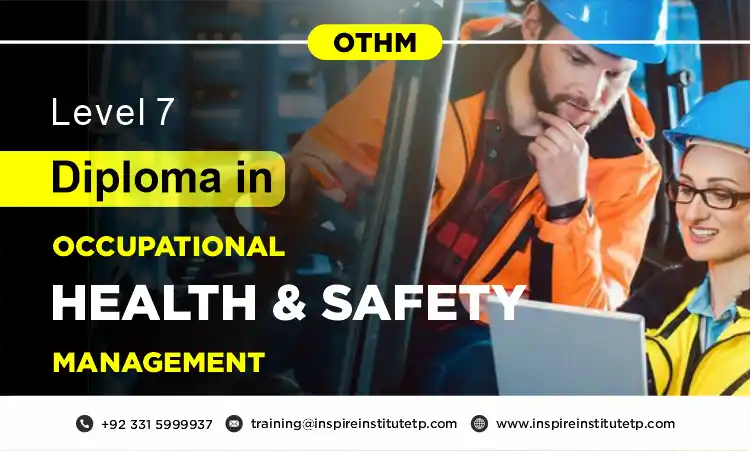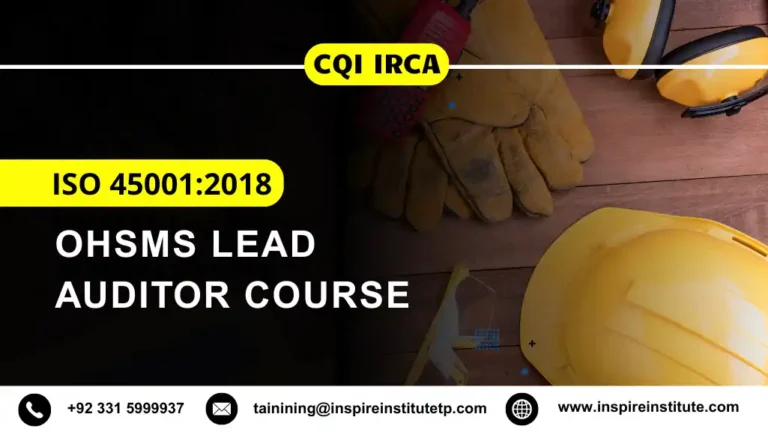ISO 45001:2018 Occupational Health and Safety Management Systems (OHSMS) Lead Auditor Course
The ISO 45001:2018 Occupational Health and Safety Management Systems (OHSMS) Lead Auditor Course is designed for professionals seeking to enhance their auditing skills in the context of occupational health and safety. This comprehensive course provides participants with the knowledge and tools to conduct effective audits of OHSMS based on the ISO 45001 standard. Attendees will learn about the principles of risk management, the requirements of the standard, and effective auditing techniques. By the end of the course, participants will be equipped to lead audits that ensure organizations comply with OHS standards, promoting a safer and healthier workplace.
Why Choose this Qualification
Choosing the ISO 45001:2018 Occupational Health and Safety Management Systems (OHSMS) Lead Auditor qualification offers several key advantages:
- Enhanced Career Opportunities: This qualification is highly regarded in various industries, making it a valuable asset for professionals looking to advance their careers in health and safety management.
- Expertise in Standards: Understanding ISO 45001 equips auditors with the skills to assess and improve an organization’s safety management practices, ensuring compliance with international standards.
- Improved Workplace Safety: By mastering auditing techniques, qualified individuals can help organizations identify hazards, mitigate risks, and foster a culture of safety, ultimately reducing workplace incidents.
- Versatile Application: The skills gained from this course can be applied across multiple sectors, including manufacturing, construction, and healthcare, broadening your professional scope.
- Networking Opportunities: Engaging with fellow professionals in the course provides valuable networking opportunities, facilitating knowledge sharing and collaboration.
- Contribution to Organizational Success: By ensuring effective OHSMS implementation, auditors play a crucial role in enhancing organizational performance and sustainability, making a positive impact on employee well-being and operational efficiency.
Overall, this qualification empowers professionals to lead with confidence in promoting occupational health and safety standards within their organizations.
Course Overview
Ofqual Regulated Qualification
Class Duration : 5 days online classes
Average Completion Time:
2 to 3 weeks
Study Units: 6 Units
Evidence & Assignment Based
Qualification Structure
The ISO 45001:2018 Occupational Health and Safety Management Systems (OHSMS) Lead Auditor Course consists of 6 mandatory unit for this qualification.
Mandatory Units
Who Should Take This Course
The ISO 45001:2018 Occupational Health and Safety Management Systems (OHSMS) Lead Auditor Course is ideal for a variety of professionals, including:
- Health and Safety Managers: Those responsible for developing and implementing safety policies will benefit from a deeper understanding of auditing practices and compliance with ISO standards.
- Internal Auditors: Professionals tasked with conducting internal audits can enhance their skills in assessing OHSMS effectiveness and identifying areas for improvement.
- Quality Managers: Individuals involved in managing quality systems can integrate safety management with overall quality processes, ensuring a holistic approach to organizational excellence.
- Compliance Officers: Those who oversee regulatory compliance will gain insights into how to effectively evaluate adherence to occupational health and safety regulations.
- Safety Officers and Advisors: Professionals focused on promoting workplace safety will enhance their auditing capabilities, allowing them to better assess and improve safety practices.
- Consultants: Safety consultants seeking to expand their expertise and offer OHSMS auditing services will find this qualification invaluable.
- Executive Leaders: Senior management looking to understand the importance of OHSMS and its impact on organizational performance can benefit from this course.
Overall, anyone involved in occupational health and safety, quality management, or regulatory compliance will find this course beneficial in advancing their skills and contributing to a safer workplace.
.
Course Benefits
The ISO 45001:2018 Occupational Health and Safety Management Systems (OHSMS) Lead Auditor Course offers numerous benefits for participants:
- Comprehensive Knowledge: Gain in-depth understanding of the ISO 45001 standard, including its principles, requirements, and the context of occupational health and safety management.
- Auditing Skills Development: Learn effective auditing techniques, including planning, conducting, and reporting on audits, enabling you to evaluate OHSMS compliance and effectiveness.
- Risk Management Expertise: Enhance your ability to identify and assess workplace hazards, enabling proactive risk management and improved safety outcomes.
- Career Advancement: Boost your professional credentials and marketability, making you a more competitive candidate for roles in health and safety management and auditing.
- Improved Safety Culture: Contribute to fostering a positive safety culture within organizations, ultimately reducing workplace incidents and promoting employee well-being.
- Practical Application: Engage in real-world scenarios and case studies, allowing you to apply theoretical knowledge to practical situations in occupational health and safety.
- Networking Opportunities: Connect with fellow professionals and industry experts, facilitating valuable relationships that can lead to collaboration and knowledge sharing.
- Certification Potential: Successfully completing the course prepares you for certification as an ISO 45001 Lead Auditor, enhancing your credentials and professional standing.
- Organizational Impact: Equip yourself with the skills to drive continuous improvement in OHSMS, contributing to overall organizational performance and compliance with legal and regulatory requirements.
By completing this course, participants will emerge as proficient auditors capable of leading efforts to improve occupational health and safety standards in their organizations.
Eligibility Criteria
Educational Background: A minimum of a high school diploma or equivalent is required. A degree in occupational health, safety, environmental management, or a related field is preferred.
Professional Experience: At least two years of work experience in a relevant role related to occupational health and safety, quality management, or auditing is recommended.
Basic Knowledge of ISO Standards: Familiarity with ISO management system standards, particularly ISO 45001, is advantageous, although not mandatory.
Auditing Experience: Previous experience in auditing or managing occupational health and safety systems is beneficial but not essential.
Commitment to Learning: Participants should be motivated to enhance their knowledge and skills in OHSMS auditing and management.
FAQs
The Qualification Process
Here is a step-by-step guide to help you understand the entire journey from pre-registration to certification:
- Self-Assessment:
Begin by evaluating your eligibility for the course. Ensure you meet the entry requirements, such as relevant qualifications or professional experience, as outlined for the program. - Registration:
Complete your registration by submitting the required documents, including a scanned copy of a valid ID, and pay the necessary registration fee. This is your first official step in the qualification process. - Induction:
An assessor will conduct an induction session to verify your eligibility and introduce you to the evidence requirements. During this stage:- If the assessor finds that you meet all the necessary criteria, you will proceed to the next step.
- If you do not meet the entry requirements, your registration will be canceled, and your fee will be refunded.
- Evidence Submission:
Based on the assessment criteria, you will need to submit evidence demonstrating your knowledge and competence. Consult with your assessor if you need clarification on the type and nature of the evidence required. This evidence could include assignments, projects, case studies, or professional experiences related to sustainability management. - Feedback and Revision:
The assessor will review your submitted evidence and provide feedback. Evidence that meets the required criteria will be marked as “criteria met.” If there are any gaps, the assessor will highlight them, and you will need to address those gaps by revising and resubmitting the evidence. - Competence Evidence:
Submit your final evidence demonstrating that you have successfully achieved all the learning outcomes. The assessor will mark your submission as “Criteria met” once everything is up to standard. - Internal Quality Assurance (IQA):
After your evidence is approved by the assessor, the Internal Quality Assurance Verifier (IQA) will review it to ensure that the assessment was carried out consistently and according to ISO standards. - External Verification:
The IQA then presents your portfolio to ISO External Quality Assurance Verifiers (EQA) for final confirmation. The EQA may contact you directly to verify the authenticity of your evidence. - Certification:
Once all internal and external checks are completed to satisfaction,ISO will issue your official certificate, confirming that you have successfully achieved the qualification.
This comprehensive process ensures that learners demonstrate all necessary competencies and meet the high standards required for the ISO 45001:2018 Occupational Health and Safety Management Systems (OHSMS) Lead Auditor Course.







